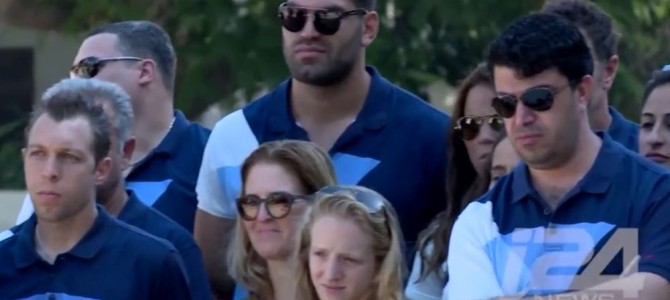
Every two years, countries put aside petty differences to join hands and sing “Kumbaya” at the Olympics. Or, more accurately, we don’t. Notions of friendly competition between nations and “the Olympic spirit” are wonderful theory, but politics always seems to intrude.
There are peoples who have had trouble getting along since forever. For example, Britain’s Independent reported that “Serbian officials have told their athletes not to appear on any of the medal stands alongside their Kosovan counterparts, despite their athletes only competing in two events.” That directive deserves condemnation, but at least Kosovo’s athletes can be comforted knowing that all other nations welcome their participation. By contrast, no group has faced more widespread, blatant bigotry than #TeamIsrael.
Now, I readily admit I have my own political beefs. I’ve long despised the governments in Iran, North Korea, and Zimbabwe. But I can’t imagine ever meeting and mistreating some young athlete from one of those countries. That would feel remarkably ungracious, or in an Olympic context, unsportsmanlike.
Unsportsmanlike Olympic Conduct
Yet that is precisely the sort of behavior Israel’s Olympic team has encountered in Rio. I was initially surprised when I read headlines reporting that Lebanon’s Olympic team had physically blocked Israel’s team from riding a bus to the opening ceremony, earning a mere reprimand. Yet I shouldn’t have been.
Sure, it’s 2016, but anti-Semitism is alive and well. Much of that ancient hatred is now couched as anti-Israel sentiment, which is supposedly more genteel and less likely to be called out. That means if you’re representing Israel in an international context — even one that is officially apolitical, like the Olympics — you can encounter seriously ugly behavior.
Beyond that bus incident, Saudi judoka “Joud Fahmy forfeited her first-round judo match against Christianne Legentil from Mauritius at the Rio Olympic Games on Sunday, in what Hebrew media said was a maneuver to avoid facing Israeli judo fighter Gili Cohen in the next round.” Then on Friday, Egyptian judoka Islam El Shehaby repeatedly refused to shake hands with Israeli Or Sasson after losing their match; that violated judo etiquette and standard good manners.
It’s heartening that the crowd booed El Shehaby’s behavior, but the International Judo Federation’s reaction was pathetic: “‘This is already a big improvement that Arabic countries accept to (fight) Israel,’ spokesman Nicolas Messner said in an email.” Considering that Egypt has officially been at peace with Israel since 1979, El Shehaby’s behavior represents zero progress. Further, if this incident had involved any nation other than Israel, there would undoubtedly have been a stronger condemnation.
The International Olympic Committee (IOC) acquitted itself better. They announced later on Friday: “‘The President has immediately set up a disciplinary commission to look into this incident.’”
The Olympics Is Political
Team USA has had some awe-inspiring and historic displays in Rio. However, the overall picture is not one of only sunshine and rainbows. If anything, the Olympics resembles the distasteful politics of the United Nations more than it does the triumph of the brotherhood of man. So can we stop pretending the Olympics aren’t political? At least since 1936, when Hitler used the games to look statesmanlike—while already subjecting German Jews to the repressive Nuremberg Laws—the Olympics have failed to shield sports from politics.
For #TeamIsrael, that is all the more true. Sports Illustrated reported in 2012, “‘Representing Israel is wonderful, but it’s a whole different experience,’ says Andy Ram, a tennis player competing in his third Olympics. ‘You’re a sportsman, but sometimes you’re also a diplomat.’” Added sailor Gidi Kliger, “’Know what would be nice? . . . I wish we could go and just have the normal Olympic experience. Nothing political, nothing special, no protests, no ceremonies. Just athletes competing.’”
Unfortunately, political gestures seem to be the norm where Israeli athletes are concerned.
The Legacy of the Munich Massacre
Since 1972, there has also been the open wound of the 11 Israeli athletes and coaches who were tortured and murdered at the Munich Olympics while the IOC largely shrugged:
Munich organizers declared that the Games must go on—Jim Murray, the great Los Angeles Times columnist, likened that to ‘having a dance at Dachau’—they held a memorial service that drew a crowd of 80,000 to the Olympic Stadium. There, 10 Arab countries refused to lower their flags to honor the murdered athletes.
Ankie Spitzer, who was widowed by that Black September attack, has lobbied for a moment of silence at every summer Olympics since 1976. The BBC reported: “The request was turned down, and [Spitzer] says she was told it was ‘because then there were 21 Arab delegations and if they [the IOC] would do a memorial all these delegations would boycott, and they would go home’. There have been other ‘excuses’ since.”
It took 44 years and a new IOC president, but Ankie Spitzer finally found closure, as those Israeli lives were acknowledged at a public ceremony this August. IOC chief Thomas Bach read the names of the murdered Israelis aloud and explained: “‘We commemorate them because this was an attack not only on our fellow Olympians, but also an assault on the values that the Olympic Village stands for. It was an attack on the universal power of sport to unite all of humanity in peace and solidarity.”
That’s a beautiful sentiment, and publicly remembering young lives that were senselessly snuffed out is a step in a just direction. Here’s hoping that under Bach’s leadership the IOC becomes increasingly serious about making that vision a reality for all participating athletes, including Israel’s.









